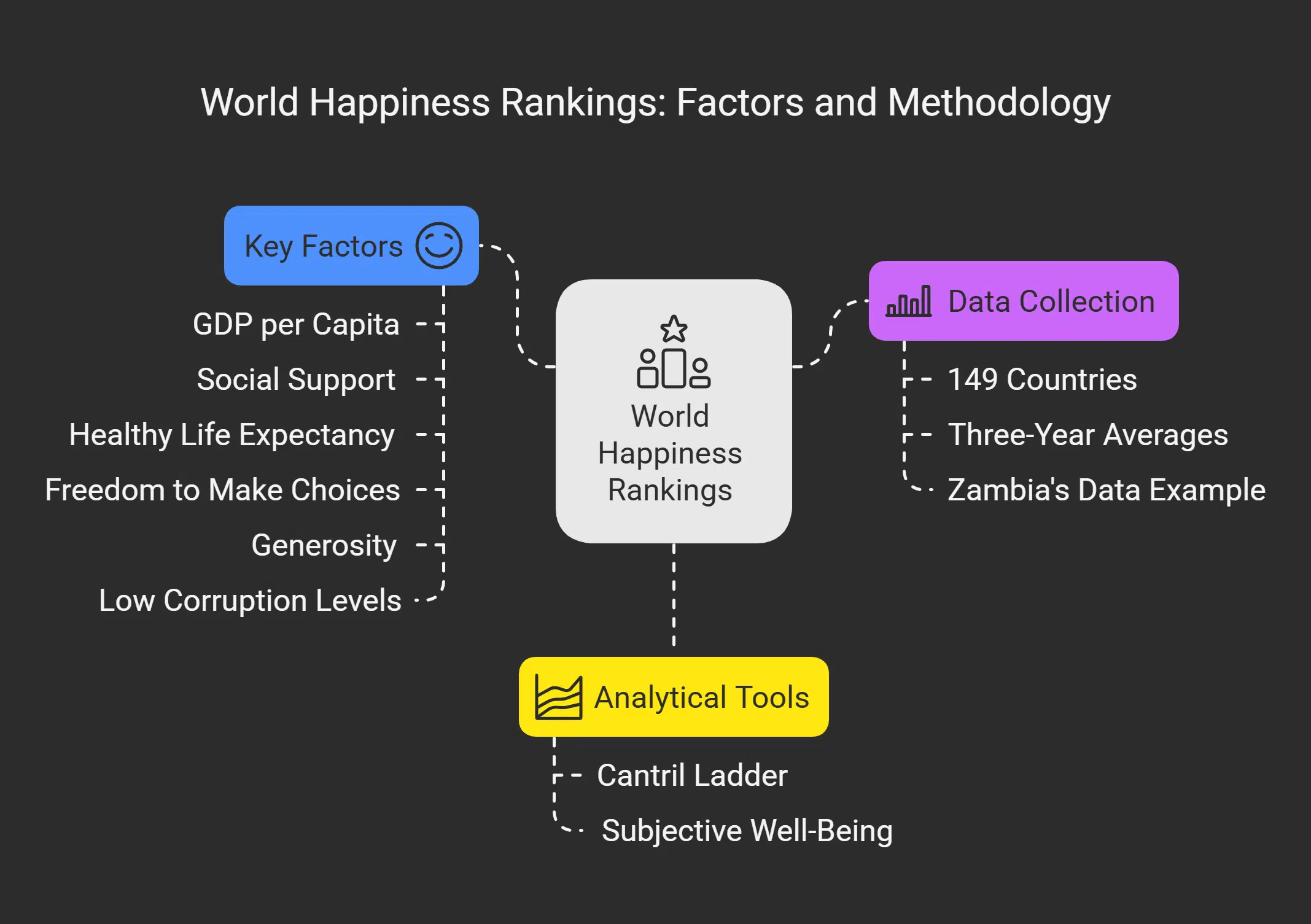Are you curious about the happiest places on Earth? Life can feel stressful at times, with work, money worries, and a lack of balance weighing us down. Many people wonder if there are countries where happiness seems easier to achieve.
The good news is—there are!
The “World Happiness Report 2025” has ranked the “Happiest Countries in the World,” and Finland takes the crown once again. These rankings provide insights into why some nations excel in life satisfaction, social support, and well-being.
In this article, you’ll find the top 10 countries leading in happiness. We’ll examine what makes them examples of joy and quality living. Keep reading—you may even find inspiration for your own journey to happiness!
Key Takeaways
- Finland ranks as the happiest country in 2025 with a score of 7.741, excelling in trust, social support, and work-life balance.
- The World Happiness Report uses six key factors: GDP per capita, social support, life expectancy, personal freedom, generosity, and low corruption levels.
- Nordic countries like Denmark (2nd) and Iceland (3rd) stand out for universal healthcare and strong community ties.
- Israel ranks 5th despite challenges; it shows resilience through high youth satisfaction and cultural bonds.
- Countries like Luxembourg (8th) have small populations but rank high due to strong economies and low corruption rates.
Exploring the World Happiness Report
The World Happiness Report measures happiness in six key areas. It uses data from Gallup surveys across 149 countries to rank life satisfaction. GDP per capita, social support, healthy life expectancy, personal freedom, generosity, and low corruption levels shape these rankings.
Since 2002, the report has tracked happiness trends globally. Finland leads with a score of 7.741 for 2025. This analysis highlights differences between nations while focusing on well-being and human flourishing.
Economic growth and quality of life remain central themes as we move closer to understanding what makes a country joyful.
How the World Happiness Rankings Are Determined
Gallup polling collects data from 149 countries to rank happiness globally. Six key factors shape these rankings: GDP per capita, social support, healthy life expectancy, freedom to make choices, generosity, and low corruption levels.
Economies with higher incomes often score better on GDP per capita. Social ties measure how much help people can expect when facing hardships. Longer lifespans also contribute by showing health-related quality of life in a nation.
The rankings rely on three-year averages for accuracy. For example, the 2023 World Happiness Report used data spanning 2020–2022. In some cases, earlier years fill gaps where full results weren’t available; Zambia’s numbers reflect 2020–2021 statistics instead of newer ones.
Analysts use tools like the Cantril Ladder to ask citizens about their life satisfaction directly. This keeps findings closely tied to subjective well-being while balancing economic indicators and public opinion together into one big picture!
Top 10 Happiest Countries in the World 2025
These countries shine with high happiness scores, thanks to strong social support, balanced lives, and trust in their communities—keep reading to see what makes them stand out!
1. Finland
Finland holds the top spot in the world happiness rankings for the sixth year in a row, scoring an impressive 7.741. People here trust each other deeply, which builds strong social connections.
The government works with honesty, keeping corruption almost non-existent. Even during tough times like the COVID-19 pandemic, Finland managed to stay resilient and content.
The country balances daily life well with work-life harmony and universal healthcare systems. High GDP per capita ensures financial stability for most citizens. Mental health support is prioritized by policymakers, helping children and adults thrive emotionally.
Finland proves happiness stems from trustworthiness and shared values rather than extravagance or complexity!
2. Denmark
Right behind Finland, Denmark holds a strong spot in happiness rankings. Its score of 7.583 shows why it remains one of the happiest countries on Earth. Though slightly lower than last year’s 7.59, Denmark still thrives with excellent quality of life and well-being measures.
The Kingdom of Denmark excels in GDP per capita and generosity levels among citizens. Older adults report high satisfaction here, reflecting stellar social support systems like universal healthcare.
Low perceptions of corruption also play a key role in boosting trust within this Nordic country’s society.
3. Iceland
Iceland holds steady with a happiness score of 7.525. This small Nordic country excels in social support, ranking the highest among the top seven happiest nations. It also stands out for fostering happiness in its youth, showing strong levels of life satisfaction across generations.
With universal healthcare and low perceptions of corruption, Iceland continues to shine as a model for well-being. Its breathtaking landscapes might boost mental health too, though policies like sustainable development likely play a bigger role.
Residents here enjoy healthy life expectancy and balanced work-life routines despite long winters.
4. Sweden
Sweden scores 7.344 on the World Happiness Report in 2025. It now ties with Israel for sixth place, moving up from its previous ranking. Sweden stands out for high happiness among older adults, though youth report lower life satisfaction levels.
Known for strong social support and universal healthcare, Sweden prioritizes well-being. The country’s policies focus on work-life balance and sustainable development, ensuring a healthy life expectancy for citizens.
Its residents trust public institutions due to the low perceptions of corruption here. Up next is Israel!
5. Israel
Israel ranked fifth on the 2025 World Happiness Report with a score of 7.341. It dropped from fourth but stayed strong despite challenges like the October 7th attacks. Youth satisfaction remains high, though older adults feel less content.
Resilience plays a key role in Israel’s ranking. Social support and community ties keep spirits up even during tough times. Strong family bonds and shared cultural values foster happiness across generations.
6. Netherlands
The Netherlands scored 7.319 in the World Happiness Report 2025. Though it fell from fifth place, its life evaluations remain high. The country shines for generosity and economic strength, boasting one of the top GDPs among this year’s leaders.
It excels at work-life balance and health care access. Citizens enjoy a stable democracy with low corruption levels. These factors create an environment where people feel satisfied and secure.
Norway continues to showcase similar traits next on the list!
7. Norway
Norway holds 7th place in the happiness rankings with a score of 7.302. This Nordic country offers free healthcare and education, giving its citizens peace of mind. People enjoy an excellent work-life balance, which boosts life satisfaction.
Strong social support plays a huge role in Norway’s happiness factors. Norwegians benefit from universal healthcare and sustainable development policies. The Kingdom of Norway prioritizes physical health, mental well-being, and gross domestic product (GDP) growth to maintain high levels of contentment among its people.
8. Luxembourg
Luxembourg ranks 8th in the world happiness rankings for 2025 with a score of 7.12. This small European country is home to about 655,112 people and covers just 2,586 square kilometers.
Despite its size, it stands tall in GDP per capita, one of the key happiness factors in global surveys.
The nation’s citizens benefit from strong social support and universal healthcare systems. Perceptions of corruption are low, which boosts trust among residents. Luxembourg also offers a high life satisfaction rate due to work-life balance efforts and sustainable development policies that prioritize well-being over rapid economic growth.
9. Switzerland
After Luxembourg, Switzerland takes a proud spot on the happiness rankings with a score of 7.06. Although it dropped from its previous score of 7.24, this alpine nation remains one of the happiest countries globally.
Switzerland’s high GDP per capita and strong social support system play key roles in its ranking. Citizens enjoy universal healthcare, low unemployment rates, and long healthy life expectancy.
Its transparent governance reduces perceptions of corruption while fostering trust among people. The scenic Swiss Alps don’t hurt either—they offer breathtaking views that soothe both body and mind!
10. Australia
Australia scored 7.06 on the happiness rankings, slightly lower than its previous score of 7.09. Its strong sense of social support and high GDP per capita contribute to this ranking.
Australians value life satisfaction, as seen through the “Cantril ladder” survey from the Gallup World Poll.
The country benefits from universal healthcare and sustainable development policies. Work-life balance remains a key focus for many Australians, fostering well-being across generations.
The absence of corruption helps build trust in Australia’s systems, while healthy life expectancy further boosts their World Happiness Report scores.
Factors That Drive Happiness in These Nations
Social support plays a large role in these happiest countries. Finland, Denmark, and other Nordic nations have close communities. Friends and family offer help during tough times. The Gallup World Poll measures people’s confidence in having someone to rely on.
This sense of security increases happiness rankings. Low levels of perceived corruption contribute too. Citizens trust their governments more when fairness is visible.
Freedom to make life choices also matters greatly. People are happier when they feel in control of their lives. Healthy life expectancy adds another aspect of well-being here, with access to universal healthcare ensuring longer lives in places like Sweden and Norway.
Generosity is factored into scores as well—residents willingly give back through pro-social behavior or taxes that fund public services used by all citizens.
Healthy work-life balance is notable across nations such as Switzerland and Australia—a point many policymakers emphasize globally nowadays with changing workforce needs revealed after interruptions like the COVID-19 pandemic shifting paradigms almost overnight.
Moving to the next section covers this topic thoroughly, tying results and observations together for clearer understanding.
Takeaways
Happiness is not just a feeling; it’s shaped by trust, purpose, and care. The top 10 happiest countries in the world in 2025 remind us of this truth. Nations like Finland and Denmark lead by investing in health, balance, and fairness.
These rankings show how community support and life satisfaction create lasting joy. What changes could improve happiness where you live? Think about the small steps that can build strength in your own space.
Start now—happiness starts with action!
FAQs on Happiest Countries in the World
1. What is the World Happiness Report?
The World Happiness Report is a global study that ranks countries based on happiness factors like life satisfaction, GDP per capita, and social support. It’s backed by the United Nations and uses data from sources like the Gallup World Poll.
2. Why are Nordic countries often ranked as the happiest?
Nordic countries, such as Denmark and Sweden, rank high due to strong social support systems, universal healthcare, work-life balance, and low perceptions of corruption. Their focus on sustainable development also plays a big role in happiness rankings.
3. How does life expectancy affect happiness rankings?
Healthy life expectancy contributes significantly to well-being scores in world happiness reports. Countries with longer lifespans tend to rank higher because people associate good health with overall contentment.
4. Does money determine which country is happiest?
While GDP per capita matters for basic needs and economic stability, it’s not everything. Social connections, mental health care access, altruism levels, and absence of corruption weigh just as heavily in measuring well-being.
5. How did COVID-19 impact these rankings?
The pandemic shifted priorities globally—factors like mental health in children and resilience gained more attention during evaluations for 2025’s world values survey results.
6. Are there lessons other nations can learn from top-ranked countries?
Absolutely! Policies promoting empathy-driven parenting or mindfulness programs help improve correlations between government actions and public esteem levels worldwide—even outside Northern Europe or Scandinavian Peninsula regions known for their virtuous models of governance!







































